網上版請按此

Open data to cultivate I&T development
In her policy address last week, Chief Executive Carrie Lam Cheng Yuet-ngor showed her administration's commitment to innovation and technology (I&T) development by pledging HK$4 billion for the required infrastructure for the city's re-industrialization efforts.
However, we should not forget the software needed for I&T development.
Firstly, data is seen as the "new oil", a key resource for driving the digital economy.
Lam, in her speech, said all government departments will be required "to formulate and publish their annual open data plans by the end of this year". But no timeline and detailed plans were given as to what data and when the data will be opened to the public.
Through the years, the government has collected large amounts of data and should therefore take the lead in making such data available to the public, by means of a common spatial data infrastructure, to catalyze new opportunities.
Europe, the United States and Singapore have long established this kind of platform to reap the benefits of the latest technology. But ours will not be fully operational until 2023. This will likely weaken Hong Kong's leading position in I&T development.
Furthermore, to facilitate the applications development, the open data should be available in an application programming interface (API) by default.
Secondly, the government plans to build the civil service college in eight years and at the same time upgrade the ability of civil servants through on-the-job training in digital capability.
In this regard, our neighbor Singapore offers a good reference. The country plans to enhance the capability of 14 percent or 20,000 of its civil service officers in data analytics with all public officers gaining basic digital literacy within five years. Moreover, all the ministries are required to have at least one project using artificial intelligence for formulating policies by 2023.
We need to speed up our program to remain competitive.
Thirdly, a new Smart Government Innovation Lab will be set up. To optimize its effectiveness, the lab should consider collaborating with the Data Studio of the Hong Kong Science and Technology Parks Corp., which has much open data from private and public sectors for startups to keep testing and fine-tuning solutions until they are ready for the market.
Fourthly, our policy to attract overseas I&T talent should be effective as many countries around the world are competing fiercely in this arena. The response to the Technology Talent Admission Scheme launched in June this year was said to be lukewarm. We must address our shortcomings such as high cost of housing, cumbersome procedures in obtaining government financial assistance for startups, as well as outdated measures to protect existing stakeholders by barring innovation and the new economy.
Lastly, the chief executive has promised to raise research and development expenditure from 0.73 percent of the GDP to 1.5 percent in five years' time, and has been setting a goal of HK$45 billion a year. However, only HK$28 billion has been earmarked for this year. Are we going to make up for the outstanding HK$17 billion later?
Promoting I&T industry is now the most important element for our future, and not just optional, to ensure Hong Kong's continued prosperity.
I hope the government will act fast and strive harder.
Dr. Winnie Tang
Honorary Professor, Department of Computer Science, The University of Hong Kong